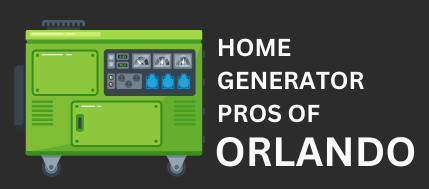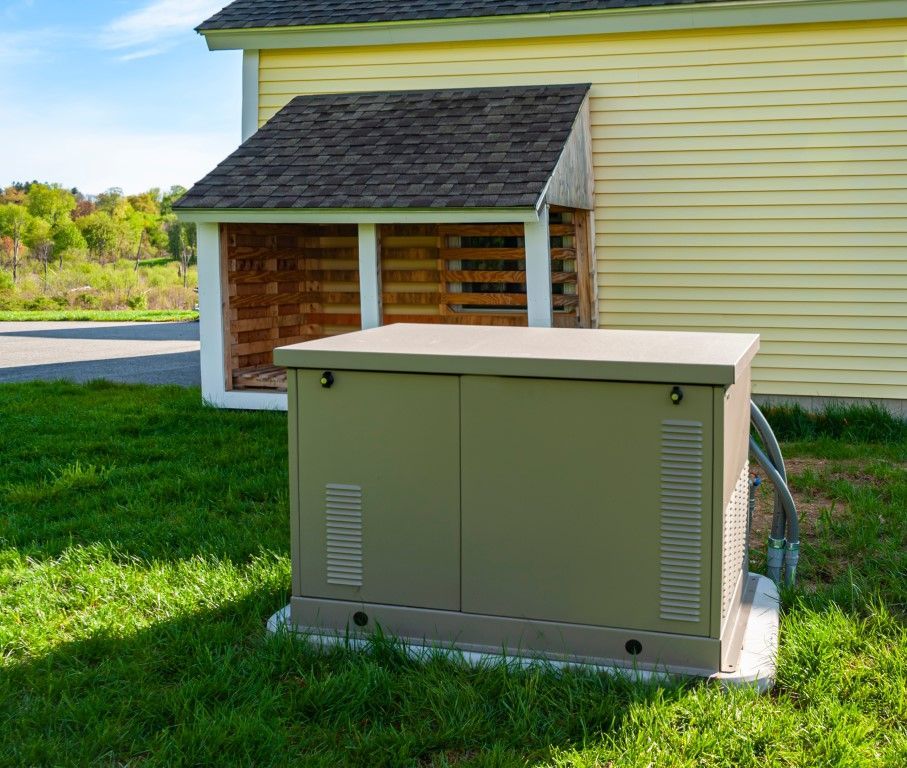
Residential Generators in Orlando FL
A reliable power source is crucial. Unpredictable weather conditions and occasional power outages make having a residential generator an essential investment. A residential generator is a device designed to provide backup power to your home during an electrical outage. It can automatically kick in when the main power source fails, ensuring your household continues to run smoothly. When considering a generator, it's important to assess your home's power needs, the frequency of outages in your area, and the generator's capacity to meet those needs.
Different Types
Generators come in several types, each suited to different needs. Portable generators are versatile and can be moved around as needed, making them ideal for occasional use or small power needs. Standby generators, on the other hand, are permanently installed and offer a more robust solution. They automatically start during a power outage and are connected to your home's electrical system. There are also inverter generators, which provide clean, stable power and are typically quieter, making them suitable for sensitive electronics.
Key Features to Consider
When choosing a residential generator, several key features should be considered. Power output is crucial; ensure the generator can handle your home’s electrical load. Fuel type is another consideration, with options including gasoline, diesel, and natural gas. Additionally, consider the generator’s runtime, noise level, and ease of maintenance. Automatic start capabilities and remote monitoring features can also enhance convenience and reliability.

We will get back to you as soon as possible.
Please try again later.
Considerations When Choosing a Generator
Selecting the right generator involves evaluating several factors. Determine your household's power requirements by listing essential appliances and their power needs. This will help you choose a generator with sufficient capacity. Consider the fuel source that is most practical for your situation, taking into account availability and cost. Installation and maintenance needs are also important—ensure you have access to professional services and that the generator you choose is compatible with your home’s setup.
Installation and Maintenance Tips
Proper installation and maintenance are vital for the longevity and efficiency of your generator. Installation should be carried out by a licensed professional to ensure safety and compliance with local codes. Regular maintenance, including oil changes, filter replacements, and system checks, will keep the generator in top working condition. It’s also important to test the generator periodically to ensure it operates correctly when needed.
Initial, Installation, and Operating Costs
The cost of a residential generator varies based on type, capacity, and features. Initial costs include the purchase price of the generator and any necessary installation expenses. Standby generators, for example, tend to have higher upfront costs compared to portable ones. Operating costs will depend on the fuel type and usage. Regular maintenance and occasional repairs should also be factored into your budget.
Importance of Having a Backup Power Source for Homes
Having a backup power source is crucial for several reasons. In the event of a power outage, a generator ensures that essential systems such as heating, cooling, and refrigeration continue to function. This is particularly important in regions like Orlando, where weather conditions can lead to prolonged outages. A backup generator can also provide peace of mind, knowing that you are prepared for unexpected disruptions.
Benefits of Having a Residential Generator
A residential generator offers numerous benefits. It provides continuous power during outages, which is essential for maintaining comfort and safety in your home. It can also prevent damage to sensitive electronics and appliances by ensuring they receive a stable power supply. Additionally, having a generator can increase your home's value and appeal, as it demonstrates preparedness and reliability.
If you’re considering investing in a
residential generator in Orlando, FL, contact us today. Our team of experts is ready to help you choose the right generator, ensure professional installation, and provide ongoing maintenance to keep your system running smoothly. Don’t wait until the next outage—prepare today to ensure your home remains powered and comfortable. By understanding these aspects of residential generators, you can make an informed decision that best meets your needs and ensures reliable power for your home.
The Cost of Installing a Residential Generator: What to Expect
In today’s world, power outages can be more than just an inconvenience—they can disrupt your daily routine and even pose safety risks. A residential generator is a valuable investment that ensures you have a reliable power source when the grid fails. However, understanding the cost associated with installing a generator is essential for budgeting and planning. When considering the installation of a residential generator, several factors influence the overall cost. Here’s a breakdown of what you might expect:

Type of Generator
- Portable Generators: These are typically the least expensive option. They are suitable for smaller homes or for those looking for temporary solutions during power outages. Prices generally range from $500 to $3,000, depending on the generator’s capacity and features.
- Standby Generators: These are more expensive but offer a more permanent solution. They are designed to automatically turn on when the power goes out and can support larger homes and more appliances. Costs for standby generators usually start around $2,000 and can go up to $10,000 or more, depending on the size and brand.
Generator Size and Power Needs
The size of the generator you need depends on your power requirements. Smaller generators might be adequate for essential appliances, while larger units are necessary for whole-house coverage. The power output, measured in kilowatts (kW), directly affects the cost. A basic setup might cost around $2,000, while high-capacity units can significantly increase the price.
Installation Costs
Installation involves several components, including the generator itself, a transfer switch, and possibly a new circuit breaker. Professional installation ensures that the generator is safely and correctly set up, which is crucial for its performance and longevity. Installation costs can range from $1,000 to $5,000, depending on the complexity of the job and local labor rates.
Permits and Regulations
Depending on your location, you may need permits for installing a generator. Local codes and regulations will dictate what’s required, and this can add to the overall cost. Permit fees can vary but generally range from $100 to $500. It’s important to check with local authorities to ensure compliance and avoid any potential fines.
Additional Costs
- Fuel Storage: Generators need a supply of fuel to operate. You might need to install a fuel tank or upgrade your existing storage solution. Costs for fuel storage can vary widely based on the size and type of tank.
- Maintenance: Regular maintenance is required to keep your generator running smoothly. This includes oil changes, filter replacements, and general inspections. Annual maintenance might cost between $150 and $300.
Long-Term Considerations
While the initial cost of installing a residential generator can be substantial, it’s important to consider the long-term benefits. A reliable generator ensures you’re never left in the dark during an outage, adds value to your home, and provides peace of mind.
Understanding the costs involved in installing a residential generator helps you make an informed decision and plan your budget accordingly. If you’re ready to explore your options or need a professional assessment, contact us today. Our team is here to provide expert advice, answer your questions, and ensure you find the right generator for your needs. Don’t wait for the next power outage to take action—reach out to us and secure your home’s power supply now.
How to Troubleshoot Common Problems with Residential Generators
Residential generators are a vital component of home safety and convenience, particularly during power outages or emergencies. They provide backup power, ensuring that essential appliances and systems remain operational. However, like any mechanical system, generators can encounter issues. Understanding how to troubleshoot common problems can save time, money, and stress. This guide will walk you through the steps to identify and resolve frequent generator issues, helping you ensure that your backup power system is always ready when you need it.
Generator Won’t Start
If your generator fails to start, the issue might be with the fuel supply, battery, or starter system. Begin by checking the fuel level and ensure there are no clogs in the fuel line. If the fuel is sufficient, inspect the battery. A dead or weak battery is a common reason for starting problems. Try recharging or replacing the battery if necessary. Additionally, check the starter motor and connections for any signs of damage or wear.
Generator Starts but Runs Roughly
When a generator starts but runs unevenly, it may be due to an issue with the fuel system, air filter, or spark plugs. Start by examining the fuel filter for clogs or debris and replace it if needed. Inspect the air filter and clean or replace it if it's dirty. Faulty or worn spark plugs can also cause rough running. Replace spark plugs as recommended by the manufacturer to maintain smooth operation.
Generator is Making Unusual Noises
Unusual noises from a generator can indicate various issues, from loose parts to engine problems. Listen for specific sounds such as rattling, banging, or grinding. Rattling noises might be due to loose bolts or components. Tighten any loose parts and check for signs of damage. Grinding or banging noises could signal internal engine issues. In such cases, consult a professional for a thorough inspection and repair.
Generator Shuts Down Unexpectedly
If your generator shuts down unexpectedly, it could be due to overheating, low oil levels, or an overloaded circuit. Check the oil level and add oil if necessary. Ensure the generator is not operating in a poorly ventilated area that might cause overheating. Additionally, examine the load on the generator to make sure it is not exceeding its capacity. Reducing the load or redistributing it can help prevent shutdowns.
Generator Won’t Produce Power
A generator that runs but does not produce power could have issues with its output connections or internal components. First, check the circuit breakers and ensure they are in the “on” position. Inspect the output connections for any loose or damaged wires. If the connections are intact, the problem might be with the generator’s internal components, such as the alternator. Testing and repairing internal components often require professional assistance.
Generator Displays Warning Lights
Many modern generators are equipped with warning lights that signal specific issues. Refer to the generator’s manual to understand what each warning light indicates. Common issues signaled by warning lights include low oil pressure, high temperature, or system faults. Address the indicated issue by following the troubleshooting steps in the manual or seeking professional help if needed.
Maintaining your residential generator in good working order is crucial for reliable performance during power outages. If troubleshooting does not resolve the problem or if you need professional assistance, don’t hesitate to reach out. Our experienced technicians are ready to help with any generator issues you may encounter. Contact us today to schedule a service appointment or to get answers to any questions you have about your generator. Ensuring your backup power system is in top shape means peace of mind for you and your family.
Let's Connect!
Power outages can be a real headache, especially if you're running a business from your home or have medical equipment that needs electricity to function properly. Don't get caught in the dark and without power. That's where Home Generator Pros of Orlando comes in. Our team of certified professionals will take care of all your home generator needs, from installation to maintenance and repairs. Don't wait until the next power outage to realize the importance of having a reliable backup generator. Call us today to schedule your consultation and get your home prepared for anything.